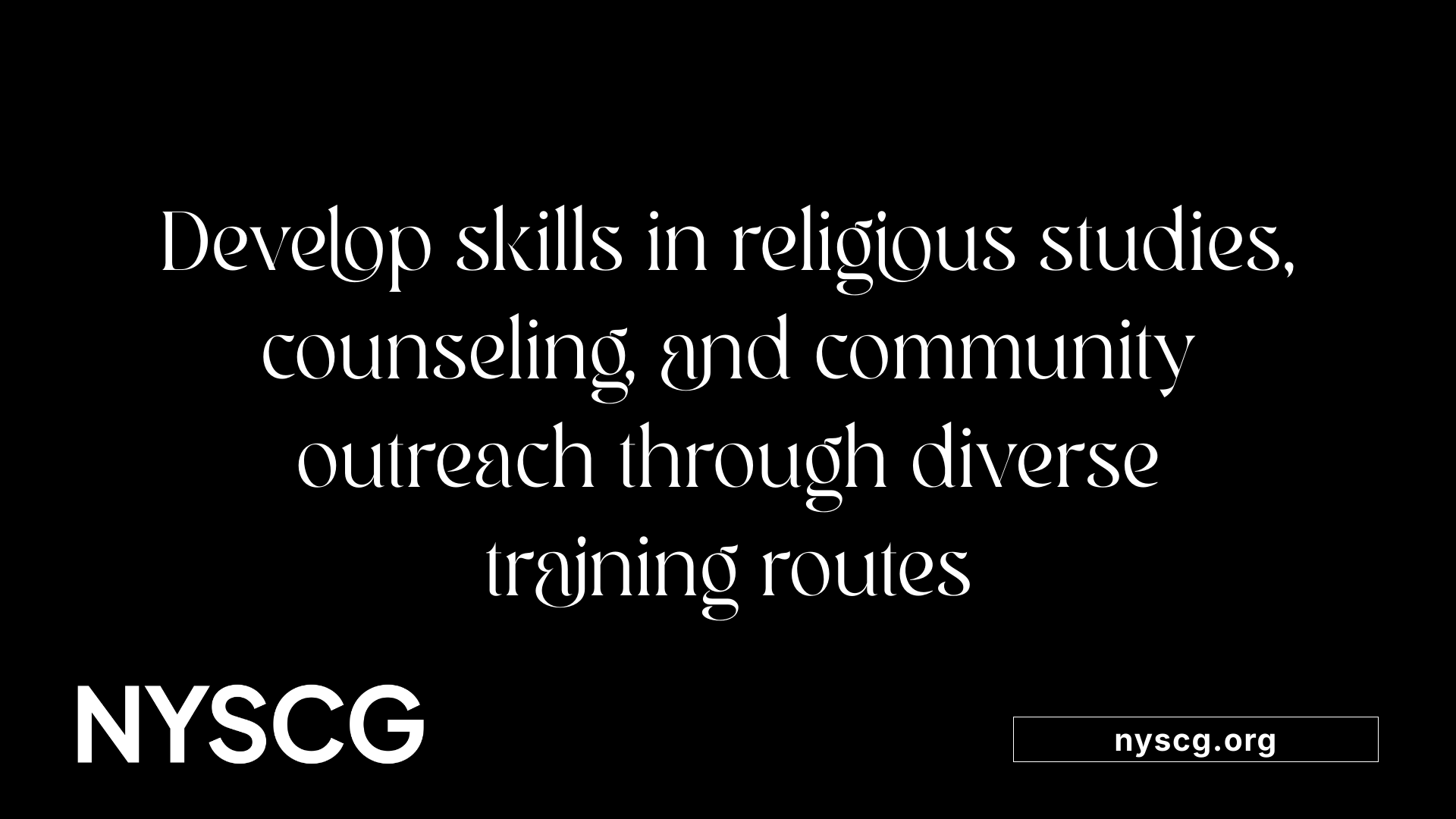Faith-Based Careers That Don’t Require a Seminary Degree


Many individuals passionate about faith seek meaningful careers within religious and spiritual sectors without necessarily pursuing traditional seminary education. Various paths and opportunities exist that leverage biblical knowledge, leadership skills, and practical experience, opening doors in community service, education, arts, and nonprofit work. This article explores diverse career options, educational routes, and skill sets needed to succeed in faith-based careers outside conventional seminary training.

Many individuals interested in faith-based work can pursue a range of careers without the need for formal seminary education. For example, roles such as religious educators, outreach coordinators, or church administrators are vital in supporting the day-to-day functions of religious organizations. These positions often value practical experience, leadership skills, and a healing or spiritual calling over advanced academic credentials.
Chaplains serve in various institutional settings including hospitals, prisons, and the military. These roles focus on providing pastoral care, counseling, and spiritual support to individuals in challenging circumstances. While some chaplaincy roles may benefit from additional certification, many do not require seminary training, especially if candidates have a solid background in theology or related fields.
Beyond traditional roles, careers in faith-based media and content creation are thriving. Religious writers, bloggers, YouTubers, and social media influencers share messages of faith, offer spiritual guidance, or discuss religious issues, expanding outreach through digital platforms. Such careers allow individuals to use their communication skills and passion for faith to reach audiences worldwide.
Nonprofit religious organizations and community outreach efforts present another avenue. These organizations work on issues like poverty, homelessness, education, and social justice, driven by religious principles. Staff members in these roles often engage in program coordination, fundraising, community education, or volunteer management. While some positions may require additional training or certification, many do not demand a seminary background.
The diversity of faith-based careers means that individuals can leverage their religious knowledge and personal calling in multiple environments. Whether providing direct spiritual care, managing church operations, creating faith-centered content, or engaging in community service, there are numerous paths for those who wish to serve without formal seminary credentials.
| Career Path | Typical Roles | Additional Notes |
|---|---|---|
| Religious Education | Sunday school teacher, faith-based counselor | Often require certification or training, not necessarily seminary |
| Outreach & Community Services | Outreach coordinator, community organizer | Focused on social impact, often values experience |
| Chaplaincy | Hospital chaplain, prison chaplain, military chaplain | May require certifications; seminary often preferred but not always necessary |
| Media & Digital Ministry | Religious bloggers, YouTubers, podcast hosts | Skills in writing, videography, and social media are essential |
| Nonprofit & Charity Work | Director, program manager in faith-based NGOs | Experience in management and grant writing can be more important than seminary background |
This broad scope of career paths demonstrates that a seminary degree, while beneficial for some, is not mandatory to work effectively within faith communities or religious organizations. Practical experience, spiritual calling, leadership skills, and specialized training often suffice to pursue meaningful and impactful careers in this field.

Many individuals interested in faith-based careers can find alternative educational routes outside traditional seminary programs. These options offer flexibility and accessibility, allowing learners to develop relevant skills tailored to various roles within religious and community organizations.
One prominent pathway involves online degree programs. For example, MVNU offers online degrees in ministry, religious education, youth ministry, counseling, and community outreach. These programs focus on practical applications, preparing students for roles such as church leaders, youth ministers, counselors, or community outreach coordinators. Online studies make it easier for people balancing work, family, or other commitments to pursue their educational goals.
Besides degrees, numerous certificates are available in specialized fields such as religious studies, biblical literacy, counseling, or nonprofit management. These certifications help individuals enhance their expertise and gain credentials for specific roles like pastoral counselors or religious educators.
Additionally, community colleges and adult education centers provide courses in theology, cultural studies, and ancient languages, which are valuable for roles in education, arts, or publishing. Gaining knowledge about religion, history, and cultural backgrounds broadens one's understanding and enhances one’s ability to serve diverse communities.
Faith-based careers aren’t limited to traditional church roles. Many non-profit organizations, charities, and social service agencies look for employees with background knowledge of religion and ethics. Obtaining relevant qualifications through non-traditional routes enables individuals to work in areas such as community development, social work, or arts outreach.
Furthermore, pursuing degrees in related fields like counseling, social work, or education can open additional doors. These programs often do not require seminary training but provide important skills for guiding, teaching, and supporting community members.
In conclusion, there are diverse educational and training routes for those pursuing a faith-based career without seminary. Online programs, certificates, non-degree courses, and related field degrees all serve as pathways to meaningful work grounded in faith, service, and community engagement.
Many faith-based roles can be pursued without the need for a formal seminary degree or ordination. These careers often emphasize certain skills and certifications that prepare individuals for diverse roles within religious and community settings.
Communication, leadership, and organizational skills are fundamental across a broad spectrum of faith-related occupations. Strong communication ability helps in teaching, counseling, and outreach, while leadership skills are essential for guiding communities or team initiatives. Organizational skills support effective program management, event planning, and administrative responsibilities.
Relevant certifications and hands-on experience play a crucial role, particularly for positions like chaplains in hospitals, law enforcement, military, or universities. While these jobs may not require a full seminary education, they typically demand specialized certifications such as spiritual care training, pastoral counseling, or clinical pastoral education.
In addition, background in biblical studies, theology, or religious education enriches one's capacity to serve effectively in various roles. For example, teachers at high school or university levels usually need at least a bachelor's or master's degree in related fields, along with specialized training tailored to their teaching environment.
Opportunities extend beyond traditional clergy roles. Many individuals work in media, digital marketing, or content creation for Christian organizations, where an understanding of biblical texts and theology helps craft meaningful messages. Similarly, social work and counseling positions aligned with spiritual or faith-based perspectives often require relevant experience and additional licenses or certifications.
Summary table of qualifications for faith-related careers:
| Role | Required Education | Additional Certifications/Experience | Typical Skills |
|---|---|---|---|
| Hospital/Military Chaplain | Bachelor's or Master's in related field | Clinical pastoral education, certification in spiritual care | Communication, empathy, leadership |
| Religious Educator | Bachelor's or Master’s in theology or religious studies | Teaching credential, specialized training in pedagogy | Communication, organization |
| Content Creator/Writer | Varies; often a Bachelor's in biblical studies | Portfolio of work, digital skills | Creativity, digital literacy |
| Social Worker/Counselor | Degree in social work, counseling, or psychology | Licensure, additional faith-based training | Listening, compassion, organization |
Background in biblical studies, theology, or religious education greatly enhances one's ability to serve authentically and effectively in various roles, whether in secular or faith-based settings.
In summary, faith-related careers outside traditional seminary or clergy paths rely heavily on strong communication, leadership, and organizational skills. Relevant credentials, certifications, and hands-on experience are vital, especially for specialized roles like chaplaincy, teaching, or community outreach. A solid foundation in biblical or theological studies not only enriches role effectiveness but also opens up additional career pathways aligned with faith and service.
Many individuals who feel called to lead in religious settings choose routes outside the conventional seminary track. Practical experience often plays a central role. For instance, volunteering in church activities, participating in internships, or taking part in mentorship programs with experienced pastors can help develop leadership skills and deepen biblical understanding.
Church-based training programs are another avenue. These programs may be tailored by local churches to prepare lay members for leadership roles, sometimes leading to the ability to serve as pastors or community leaders without formal seminary education. Such programs focus on hands-on ministry skills, biblical literacy, and church operations.
Involvement in non-denominational and alternative churches provides further opportunities. Many of these churches have flexible requirements, allowing members to serve as lay pastors or leaders after demonstrating commitment, spiritual growth, and biblical knowledge—often through self-study, online courses, or workshops.
Mentorship from seasoned pastors and active participation in community outreach and missions contribute significantly. These experiences help discern one's calling and prepare future leaders for the complexities of pastoral work.
Some churches also recognize the importance of accessible biblical education outside traditional institutions. Online courses in biblical knowledge, Christian leadership, and ministry skills are increasingly popular. These courses are often offered by Christian universities or training organizations and can be completed at one's own pace.
Moreover, obtaining an undergraduate degree in related fields such as Biblical Studies, Christian Ministry, or Religious Studies can serve as a foundation for leadership roles. While not always a requirement, these academic programs can provide essential knowledge without the need to attend seminary.
Ultimately, formal recognition like ordination or licensing usually depends on the specific requirements of a church or denomination. Many prioritize proven ministry skills, community impact, and spiritual maturity. Working closely with local churches, demonstrating leadership, and continuing education through online or local workshops facilitate pathways into formal religious leadership.
This flexible approach to becoming a church leader allows for diverse backgrounds and paths, emphasizing practical ministry experience, community involvement, and ongoing biblical learning. It broadens access for those passionate about serving and leading in faith communities, regardless of traditional educational backgrounds.
Certainly! Many fulfilling career paths exist for those equipped with biblical knowledge, even without completing traditional seminary education. These opportunities span a variety of fields including education, counseling, chaplaincy, nonprofit work, and other community-oriented roles.
One common avenue is becoming a religious educator. These professionals teach biblical texts and principles at schools, churches, or community centers. Many educators hold degrees in Biblical Studies or Theology but not necessarily from a seminary, emphasizing practical teaching skills and biblical literacy.
Counseling is another significant area. Christian counselors, youth ministers, or faith-based therapists use their biblical understanding to guide individuals through emotional, relational, or spiritual challenges. Though licensure requirements vary, a strong biblical foundation often enhances credibility and effectiveness.
Chaplaincy roles—serving in hospitals, military units, prisons, or sports teams—are accessible to those with biblical knowledge. These roles focus on providing spiritual support, comfort, and guidance in diverse settings. While some positions require additional licensure and specialized training, many organizations value practical ministry experience.
Nonprofit organizations and para-church ministries also seek personnel with solid biblical training. These entities focus on societal issues like poverty, addiction, or education, often working across cultural boundaries. Many staff members are not formally ordained but are experienced in ministry work, advocacy, and community development.
Educational roles expand beyond traditional church settings. Many Christian schools and colleges hire teachers with biblical expertise to instruct students at various levels. Additionally, roles in curriculum development or religious publishing can benefit from biblical knowledge without necessitating seminary degrees.
Building a career in these areas often involves networking and membership in professional organizations such as the Society of Biblical Literature or the American Academy of Religion. These organizations offer resources, conferences, and connections that can support career advancement.
While some roles, especially ordained ministry and certain chaplaincy functions, may require licensure or ordination, many careers are accessible with a solid biblical foundation combined with practical skills and experience. Emphasizing leadership, communication, and community engagement can open doors in faith-based and secular settings.
In conclusion, biblical knowledge provides a versatile foundation for a range of careers outside traditional seminary paths. Whether in education, counseling, community service, or cultural outreach, individuals can confidently pursue meaningful roles that serve others and promote spiritual growth.
Online and non-traditional educational paths have become increasingly recognized and respected within faith communities for those seeking careers rooted in spirituality and service.
Many accredited institutions now offer specialized programs that focus on practical skills, community outreach, and faith-based teaching. These programs often do not require attendance at traditional seminaries, making them accessible to a wider range of students, including working adults and those with family commitments.
Institutions such as Mount Vernon Nazarene University, Christian Leaders Institute, and Wilson Hill Academy provide online degrees, certifications, and coursework tailored to various faith-based roles. These include becoming pastors, youth ministers, religious educators, chaplains, or faith-based administrators.
One significant advantage of online learning is its flexibility. Students can study from home, work at their own pace, and fit education around personal and professional commitments. This approach also reduces costs associated with travel and campus living.
Furthermore, online education often emphasizes practical training alongside theological instruction. This prepares students to serve effectively in diverse settings, from local churches to community organizations.
Employers within faith organizations generally recognize and value these online qualifications, especially from reputable institutions. This recognition facilitates employment in teaching, administrative positions, and leadership roles inside churches and faith-based nonprofit groups.
In summary, online and non-traditional educational options are not only viable but increasingly essential avenues for those pursuing faith-based careers. They combine accessibility with quality education, opening pathways for many individuals to serve effectively in their chosen spiritual vocations.
Many people believe that earning a seminary degree is an absolute requirement to pursue a leadership role within the church, such as becoming a pastor or a senior minister. This is a widespread misconception. In reality, numerous effective faith-based leaders and workers have achieved their positions through practical experience, spiritual calling, and community involvement, rather than formal seminary education.
Another common misunderstanding concerns the cost and accessibility of seminary programs. Many assume that obtaining such a degree is prohibitively expensive and involves rigid, long-term commitments. However, many institutions now offer affordable, flexible programs—including online options—that accommodate individuals with various life circumstances. This increased accessibility allows aspiring ministers to pursue their education without the barrier of high costs or inflexible schedules.
There is also a mistaken belief that seminary education is solely focused on theology and biblical studies. While foundational knowledge in these areas is important, modern seminary programs often include coursework related to community service, social justice, leadership, counseling, and practical ministry skills. These elements prepare students for diverse roles in faith-based and community organizations beyond traditional church settings.
Furthermore, many perceive ministry careers as limited strictly to church roles, such as pastors or priests. In fact, seminary-trained individuals often serve in a wide array of careers, including in non-profit organizations, healthcare chaplaincy, legal advocacy, public policy, education, and international aid. They are equipped with skills that enable them to address social issues, provide counseling, and support community development.
Finally, there is an underappreciation of the importance of mentorship, hands-on experience, and personal calling in developing effective leaders in ministry. Formal education is valuable, but it is just one component. Practical experience, community involvement, and spiritual growth often serve as the foundation for a successful and impactful ministry career.
In summary, misconceptions about ministry careers tend to undervalue experiential learning, overestimate the cost barriers of seminary, and narrowly define what constitutes a ministry vocation. Recognizing the diverse pathways and qualifications necessary for effective ministry can encourage more people to pursue their calling, whether through formal education, practical experience, or a combination of both.
The landscape of faith-based careers is richer and more diverse than often presumed. While traditional pathways like seminary exist, many roles require practical experience, leadership, biblical knowledge, and community involvement rather than formal advanced degrees. Online programs, community-based training, and self-education provide accessible, flexible alternatives that empower individuals to serve their faith communities effectively. Recognizing the variety of educational routes and career options allows aspiring faith workers to pursue meaningful, impactful paths aligned with their personal calling and circumstances, ultimately broadening the scope and inclusivity of faith-based service in contemporary society.
All you need is the will to make the world a better place.
New York State chaplain group inc. is a tax deductible organization with a federal tax Id number 92-383-4921